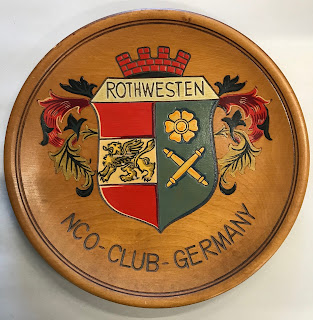Rothwesten: A Quiet German Village Makes World Headlines
From Location of Hitler's Secret Flying School to Venue for Discussions on the Economy of Post-War Germany
The
quiet German village of Rothwesten in the district of Kassel, Hesse is bordered
by Reinhardswald, a heavily-wooded range of hills covering an
area of over 200 km². It’s an area associated with fairy tales and the stories
of the Brothers Grimm.
And this is
the location that Hitler chose to build an illegal, clandestine flying school!
 |
| Rothwesten NCO Club Wooden Plate |
In
early 1935, Rothwesten was chosen to construct a secret flying school, a key first
step in Hitler’s plan for the future domination of Europe, and a move totally forbidden
in terms of the Treaty of Versailles, the treaty signed on June 28, 1919 that ended the state of war between Germany and the Allied Powers.
This
secret base was known as Rothwesten
Reichsfliegerhorst, and it became the training ground for many Luftwaffe
pilots. Most of these pilots became instructors and trained others who ended up
fighting in what would subsequently be known as World War II.
Rothwesten Reichsfliegerhorst was partially destroyed by retreating German
Forces in March/April of 1945. Soon thereafter, the Rothwesten base became the
home of the 36th Fighter Group (part of the U.S. Air Force) in April of 1945.
It was the first American unit to operate aircraft from German soil.
The air base had a very popular officers and NCO Club, used by both the German and US forces.
In April 1948, the Rothwesten barracks
was the setting of the "Conclave of Rothwesten", where various
economic possibilities were discussed for post-war Germany. The US occupation
authorities assembled a team of 25 German economic experts including Ludwig
Erhard who would later become the second Chancellor of the Federal Republic of
Germany.
The distinguished group was cut off
from the rest of the world for seven weeks, and when they finally emerged, the
quiet village of Rothwesten made world headlines. They announced that the Reichmark was
to be replaced by the Deutschmark as the official currency for Germany.

Comments
Post a Comment